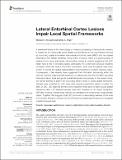Files in this item
Lateral entorhinal cortex lesions impair local spatial frameworks
Item metadata
| dc.contributor.author | Kuruvilla, Maneesh V. | |
| dc.contributor.author | Ainge, James A. | |
| dc.date.accessioned | 2017-05-17T10:30:15Z | |
| dc.date.available | 2017-05-17T10:30:15Z | |
| dc.date.issued | 2017-05-17 | |
| dc.identifier | 249879789 | |
| dc.identifier | fa48ff41-72e6-4b6b-ad63-d691c6db263c | |
| dc.identifier | 85021381210 | |
| dc.identifier | 000401657100001 | |
| dc.identifier.citation | Kuruvilla , M V & Ainge , J A 2017 , ' Lateral entorhinal cortex lesions impair local spatial frameworks ' , Frontiers in Systems Neuroscience , vol. 11 , 30 . https://doi.org/10.3389/fnsys.2017.00030 | en |
| dc.identifier.issn | 1662-5137 | |
| dc.identifier.other | ORCID: /0000-0002-0007-1533/work/60428112 | |
| dc.identifier.uri | https://hdl.handle.net/10023/10790 | |
| dc.description.abstract | A prominent theory in the neurobiology of memory processing is that episodic memory is supported by contextually gated spatial representations in the hippocampus formed by combining spatial information from medial entorhinal cortex (MEC) with non-spatial information from lateral entorhinal cortex (LEC). However, there is a growing body of evidence from lesion and single-unit recording studies in rodents suggesting that LEC might have a role in encoding space, particularly the current and previous locations of objects within the local environment. Landmarks, both local and global, have been shown to control the spatial representations hypothesised to underlie cognitive maps. Consequently, it has recently been suggested that information processing within this network might be organized with reference to spatial scale with LEC and MEC providing information about local and global spatial frameworks respectively. In the present study, we trained animals to search for food using either a local or global spatial framework. Animals were re-tested on both tasks after receiving excitotoxic lesions of either the MEC or LEC. LEC lesioned animals were impaired in their ability to learn a local spatial framework task. LEC lesioned animals were also impaired on an object recognition task involving multiple local features but unimpaired at recognizing a single familiar object. Together, this suggests that LEC is involved in associating features of the local environment. However, neither LEC nor MEC lesions impaired performance on the global spatial framework task. | |
| dc.format.extent | 12 | |
| dc.format.extent | 1660788 | |
| dc.language.iso | eng | |
| dc.relation.ispartof | Frontiers in Systems Neuroscience | en |
| dc.subject | Hippocampus | en |
| dc.subject | Spatial memory | en |
| dc.subject | Navigation | en |
| dc.subject | Medial entorhinal cortex | en |
| dc.subject | Object recognition | en |
| dc.subject | Allocentric | en |
| dc.subject | QA Mathematics | en |
| dc.subject | QH301 Biology | en |
| dc.subject | RC0321 Neuroscience. Biological psychiatry. Neuropsychiatry | en |
| dc.subject | NDAS | en |
| dc.subject | BDC | en |
| dc.subject | R2C | en |
| dc.subject.lcc | QA | en |
| dc.subject.lcc | QH301 | en |
| dc.subject.lcc | RC0321 | en |
| dc.title | Lateral entorhinal cortex lesions impair local spatial frameworks | en |
| dc.type | Journal article | en |
| dc.contributor.sponsor | BBSRC | en |
| dc.contributor.institution | University of St Andrews. School of Psychology and Neuroscience | en |
| dc.contributor.institution | University of St Andrews. Institute of Behavioural and Neural Sciences | en |
| dc.identifier.doi | 10.3389/fnsys.2017.00030 | |
| dc.description.status | Peer reviewed | en |
| dc.identifier.url | https://www.frontiersin.org/article/10.3389/fnsys.2017.00030/full#supplementary-material | en |
| dc.identifier.grantnumber | BB/I019367/1 | en |
This item appears in the following Collection(s)
Items in the St Andrews Research Repository are protected by copyright, with all rights reserved, unless otherwise indicated.

